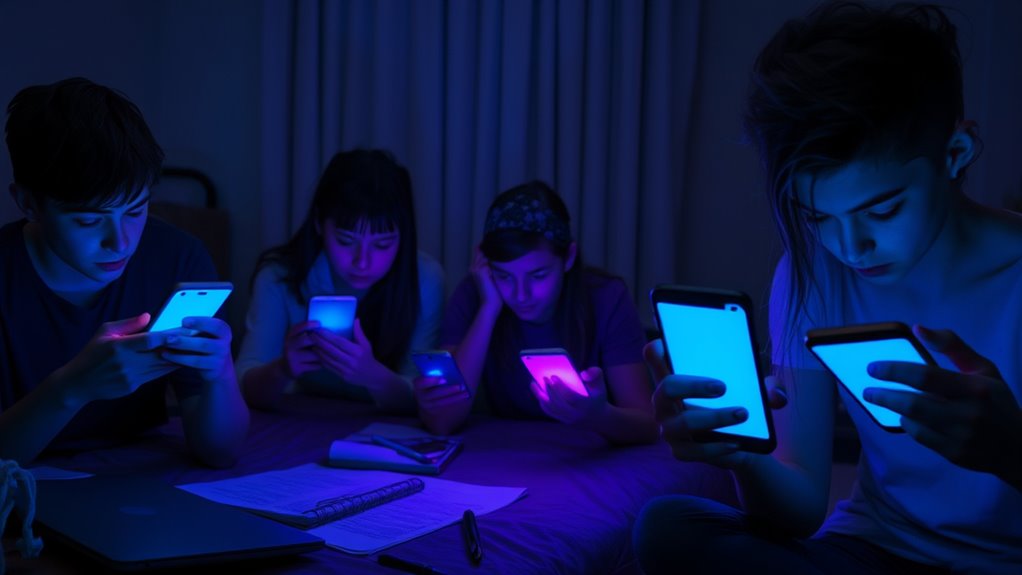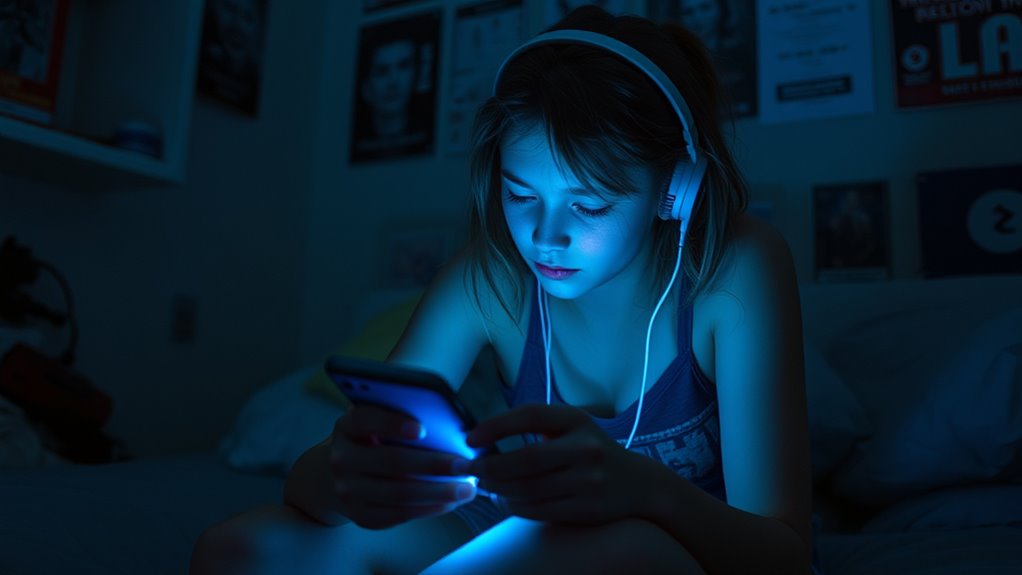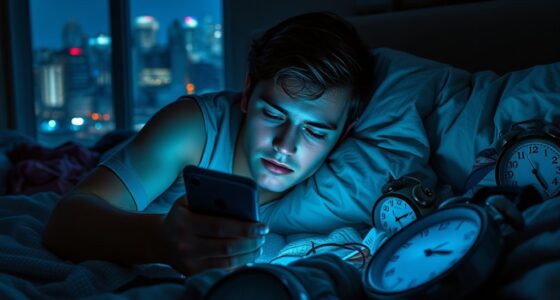Studies show that heavy social media use is strongly linked to rising depression rates among teens. When you spend too much time scrolling, it can lead to anxiety, poor sleep, and low self-esteem. Comparing yourself to curated posts worsens these feelings, making you feel inadequate or lonely. Using social media excessively often replaces real connections and validates unhealthy behaviors. Keep exploring to discover more ways social media impacts teen mental health and how you can protect yourself.
Key Takeaways
- Heavy social media use is associated with increased teen depression rates due to prolonged screen time and digital addiction.
- Comparing curated online content can lower self-esteem and contribute to feelings of inadequacy and loneliness.
- Constant online engagement fosters anxiety and compulsive checking, disrupting sleep and reducing physical activity.
- Dopamine-driven validation from likes and comments can lead to addictive behaviors linked to depression.
- Implementing screen time limits and digital literacy skills can help mitigate social media’s negative mental health effects.

Have you ever wondered if social media is affecting teens’ mental health? It’s a question many are asking as studies reveal a troubling link between heavy social media use and rising rates of teen depression. One of the biggest concerns is digital addiction, where teens spend hours scrolling through feeds, often at the expense of sleep, physical activity, and face-to-face interactions. This constant engagement creates a cycle that’s hard to break, making it feel almost necessary to check notifications or refresh feeds repeatedly. When social media becomes a compulsive habit, it can lead to feelings of anxiety and low self-esteem, especially when teens find themselves unable to disconnect.
Another key issue tied to heavy social media use is peer comparison. You might not realize it, but when you browse through curated posts of friends’ seemingly perfect lives, it’s easy to fall into the trap of measuring your worth against theirs. This constant comparison can fuel feelings of inadequacy and envy, which over time can erode your self-confidence and contribute to depression. Social media platforms often highlight only the best moments, making it seem like everyone else’s life is flawless, while your own struggles are invisible. This distorted view can make you feel like you’re missing out or falling behind, intensifying feelings of loneliness and dissatisfaction.
Constantly comparing yourself to curated social media posts can erode self-confidence and deepen feelings of loneliness and dissatisfaction.
The impact of digital addiction and peer comparison isn’t just about individual feelings—it’s about how these behaviors shape your overall mental health. The more you get caught up in these online worlds, the more you might feel disconnected from reality and your true self. The dopamine rush from likes, comments, or new followers can become addictive, leading you to seek validation online rather than through meaningful offline relationships. Recognizing the role of content consumption in emotional well-being is crucial for understanding how social media influences depression. Additionally, appliance design that encourages healthier usage habits can help mitigate these issues by promoting mindful engagement. Developing digital literacy skills can empower teens to navigate social media more consciously and reduce negative impacts. Studies also show that implementing screen time management tools can significantly lessen the adverse effects associated with social media use. Moreover, increasing awareness about the psychological effects of social media can help teens make informed choices about their online habits. Over time, this reliance on external validation can deepen feelings of depression, especially when online interactions don’t provide the comfort or support you might need.
It’s important to recognize these patterns and understand how they contribute to mental health challenges. If you find yourself constantly scrolling or feeling worse after using social media, it might be time to set boundaries. Limiting screen time, focusing on real-world connections, and practicing self-compassion can help break the cycle of digital addiction and reduce harmful peer comparisons. Remember, your worth isn’t defined by likes or followers. Taking control of your social media habits can be a crucial step toward improving your mental health and fostering a healthier, more balanced life.
Frequently Asked Questions
How Does Social Media Impact Teenagers’ Sleep Patterns?
Social media impacts your sleep patterns mainly through blue light exposure, which tricks your brain into thinking it’s daytime, making it harder to fall asleep. It also encourages social withdrawal, leading you to stay up late scrolling instead of winding down. This disrupts your circadian rhythm, reduces sleep quality, and leaves you feeling tired during the day. To improve your sleep, limit screen time before bed and take breaks from social media.
What Role Does Peer Comparison Play in Teen Depression?
Imagine you’re climbing a ladder, but each step is judged by peers’ feedback. That’s how peer comparison affects teen depression—your self-esteem takes a hit when you see others’ highlight reels, making you feel inadequate. This constant comparison can erode confidence, fueling feelings of worthlessness. Peer feedback shapes how you see yourself, and when it’s negative, it profoundly impacts mental health, increasing depression risks among teens.
Are Certain Social Media Platforms More Harmful Than Others?
You might find that certain social media platforms are more harmful than others, especially when considering platform comparison. Some platforms emphasize visual content or have less effective content moderation, leading to increased exposure to harmful material or peer comparison. You should be mindful of how content moderation varies across platforms, as it impacts the kind of content you encounter and can influence your mental health. Choosing platforms with better moderation can help reduce negative effects.
How Can Parents Monitor Teens’ Social Media Use Effectively?
You can build trust by setting clear digital boundaries, monitoring your teen’s activity, and encouraging open communication. Establish rules about screen time, social media content, and privacy, and regularly check in about their online experiences. Stay involved without being intrusive, listen without judgment, and discuss online safety. By maintaining these boundaries and fostering open dialogue, you help your teen navigate social media responsibly and confidently.
What Are Warning Signs of Depression Linked to Social Media?
You should watch for warning signs of depression linked to social media, such as withdrawal from friends, persistent sadness, or changes in sleep patterns. Be alert to cyberbullying effects, like sudden mood shifts or avoidance of online activities. Also, notice if your teen shows social media addiction signs, like constant checking or neglecting real-life responsibilities. Recognizing these signs early helps you support your teen’s mental health effectively.
Conclusion
So, as you scroll through your feeds, remember that what seems like harmless fun might be fueling the very depression it’s supposed to distract you from. Ironically, the platforms meant to connect you could be isolating you more than ever. Instead of finding support online, you might be fueling feelings of loneliness and despair. Maybe it’s time to put down the phone and reconnect with the world outside—before social media’s promise of happiness becomes its biggest irony.









